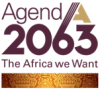Curriculum
- 7 Sections
- 7 Lessons
- 12 Weeks
Expand all sectionsCollapse all sections
- Overview- Envisioning Africa in 2063Title: Africa as We Dream It. Framing Concept: Agenda 2063 is not just a framework; it’s a generational commitment. The overview introduces Africa’s long-term vision through a celebration of its past, clarity of its present, and shaping of its future.1
- Module 1: Deepen Awareness – Understanding Agenda 2063's Value Proposition1
- Module 2: Align to Own Commitments – Personal Pathways to 20631
- Module 3: Orient Towards Moonshots – Raising Ambition, Reinforcing Strategy1
- Module 4: Engage in Partnership – Mapping Allies, Mobilizing Support1
- Module 5: Activate Knowledge – Curate, Share, Apply1
- Write-up and Reflection1
From Knowing to Doing: Making Knowledge Count for Agenda 2063
Prev
